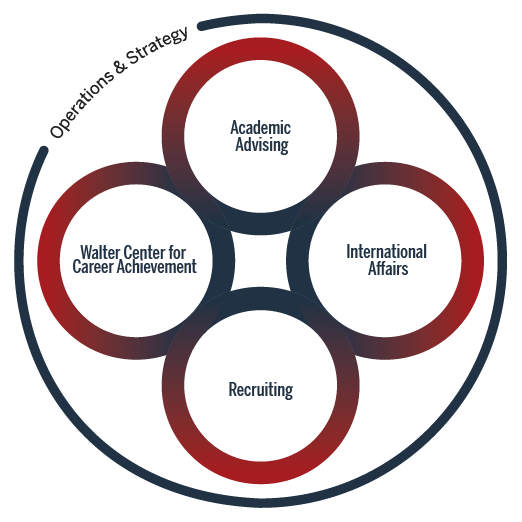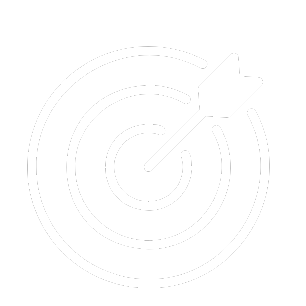The College of Arts + Sciences has aligned Academic Advising, Undergraduate Recruiting, the Walter Center for Career Achievement, Operations and Strategy, and International Programs to make up a unified, student-serving team, Academic Engagement and Student Experience (AESE). This plan charts a path to align the work of the AESE in pursuit of our vision: A transformational education, fulfilling career, and meaningful life for every College student.
Academic Engagement and Student Experience Strategic Plan

Introduction
A year-long process was used to create this plan and involved the collective work of the entire AESE team whose members volunteered their time to serve on a wide-variety of committees and working-groups focused on addressing the plan's three key priorities:
- Create the infrastructure
Work collaboratively to create the culture, policies, systems, and structures needed to realize our desired student experience. - Serve all our students
Demonstrate an imperative that in order to serve all students, we must seek to actively serve students underserved by traditional service delivery models, including Black, Indigenous, and People of Color, international, first-generation, low-income, and other marginalized student populations. - Promote the liberal arts and sciences
Expand access to, and awareness of, majors in the Liberal Arts and Sciences for prospective and current student populations. (Maximize enrollments and course registrations).
Principles
The following principles, which mirror those of other strategic plans recently established at Indiana University Bloomington, were established to guide the planning process:
- Broad, positive, outlook
The student services leaders writing this plan and all those participating in the planning process were charged with imagining the best possible undergraduate experience in the College of Arts and Sciences. Engaging in the process meant having a willingness to think beyond barriers and challenges to what could be possible. Collaboratively, we worked towards a set of ambitious and realistic strategic priorities that will guide our efforts. - Collaborating across teams towards a shared vision
The strategic priorities, goals, and action items created through this process articulate a shared approach that aligns the work of the units that make up the College's AES team (Academic Advising, Recruiting, Themester, International Programs, Operations, and the Walter Center). Our planning process was designed to bring shared purpose and intentionality to our work by prioritizing opportunities to collaborate across teams in service of students. - Inclusive process with broad participation
In creating this plan, we sought broad and diverse participation. Inclusion of multiple perspectives helped us to create what we believe is a comprehensive, value-aligned, and compelling vision and strategy.
Mission
The AESE team empowers Arts and Sciences students to thrive within the College community and to prepare for meaningful and successful lives. We facilitate learning, academic success, career development, and global understanding for all students on their path from application to graduation.
Vision
A transformational education, fulfilling career, and meaningful life for every student.
Values
+ Student-centered
+ Empathy
+ Equity
+ Adaptability
+ Growth
+ Creativity
+ Collaboration
+ Integrity
Priority 1: Build the Infrastructure
Create the student support infrastructure necessary to meet the goals and objectives of IU Bloomington 2030 and to achieve the AESE Vision: "A transformational education, fulfilling career, and meaningful life for every student."
Objectives:
- Life Design. Provide every student with an intentional introduction to the College’s vast opportunities for intellectual and personal growth, using Life Design as the framework that guides student exploration. [year 1, IUB 2030 SSO Goal 3]
- Implement a life design career course that is required of all College students and taken early in their program of study (ideally the first year).
- Build a culture of life design in the College so that students are surrounded by a community positioned to support their engagement in the process.
- Develop new programs and services that facilitate student engagement in the life design process following completion of the course (faculty partnership, academic advising conversation, mentorship, and job shadowing, etc.)
- Career Preparation. Articulate and implement a framework to integrate individualized career development services and opportunities into each year of a students’ undergraduate experiences, based upon students’ needs and career aspirations. [year 1, IUB 2030 SS0 Goal 1]
- Academic Success, Wellbeing, and Belonging. Create a set of coherent learning outcomes for the first-year experience program. Design and implement corresponding scalable programming and advising strategies to address intended outcomes. [year 1, IU 2030 SSO Goal 1]
- Peer Mentorship. Create a first-year student peer mentorship program. [year 2, IU 2030 SSO Goal 1, 3]
Objectives
- Professional Development Course. Implement a new required professional development course that equips students with the tools to effectively tell the story of their education and marketable skills/abilities in a professional setting. [year 2, IUB 2030 SSO Goal 1]
- Collaborate with academic departments to implement flexible approaches to career course sequence with room for department-delivered course (or other department delivered student engagement) when desired.
- Career Competencies. Develop a competency model that articulates the marketable skills gained through completion of coursework and pursuit of immersive learning opportunities as an undergraduate student in the College. [year 1, IU 2030 SSO Goal 1]
- Create a faculty fellows program to introduce the competency model and strategies faculty can use to elevate the model through classes they teach, making the marketable skills being taught more legible for students.
- Create tools that introduce students to Career Readiness in the College and its competency model in a coherent and compelling way.
- Implement student engagement tracking/reflection mechanism that allows students to document and reflect on their curricular and co-curricular experiences and how they align with the College’s career competency model.
- Elevated Immersive Learning. Create an individualized immersive learning planning tool that students will use to explore immersive learning opportunities and make plans to engage in immersive learning as part of their undergraduate experience. [year 1-2, IU 2030 SSO Goal 1]
- Integrate immersive learning planning tool into academic advising and career coaching conversations so that every directly admitted student will have a plan on file by the end of their second year in the College, and every transfer or newly certified student will have a plan on file by the end of their second semester in the College.
- Create an inventory of curricular and co-curricular immersive learning opportunities available in the College and publish it for students in an easily accessible format.
- Expanded Opportunity. Develop strategies to effectively connect students with opportunities to engage in at least two immersive learning opportunities prior to graduation. [year 1-3, IU 2030 SSB Goal 3, SSO Goal 1]
- Internships. Create more intentional opportunities, including internships, for
students to actively engage with industry and local communities to address real-world challenges. - Undergraduate Research. Expand opportunities for College students to engage in meaningful and mentored research and creative experiences. Reimagine ASURE for scale so that the program’s core benefits (the opportunity to conduct meaningful research, small cohort setting, and faculty mentorship) are available to all students with interest.
- Study, Service Learning, and Internships Abroad. Expand College partnership with the office of Overseas Study (as well as other campus partners) to increase the accessibility and inclusiveness of international education for College students, including study abroad, international internships, and international service-learning projects.
- Department Support. Develop scalable strategies and resources to support departments wishing to create new immersive learning opportunities within their majors. Facilitate new partnerships between disciplinary areas in the College and employers/alumni to expand the availability of internships and full-time opportunities for College students (programs in non-profits, arts, sciences, tech, etc.)
- Internships. Create more intentional opportunities, including internships, for
- Expand Funding. Support College fundraising efforts for student experience scholarships, reducing financial barriers so that all students with need have access to financial support. [year 1-3, IU 2030 SSO Goal 3]
*Immersive learning in this context is defined as those opportunities that allow students to explore and apply what they have learned through their coursework in a real-world setting. Experiential learning, work-integrated learning, or high-impact practices are other common references to this idea. The term immersive learning was chosen to signal an intentionally broad definition that may include a wide-variety of experiences from internships, study-abroad, and capstone and other undergraduate research experiences to job-shadowing/site visits, alumni/peer mentorship, involvement in a student organization, working part-time, volunteering in the community, etc.
Objectives
- Regular Interaction. Provide all students with a lead advisor whom they can develop a long-term relationship with and implement strategies that encourage students to meet with their advisor each semester. [year 1-3, IU 2030 SSO Goal 1]
- Holistic Approach. Implement a student-to-academic advisor ratio that is as close to 250:1 as possible to create bandwidth for holistic advising that encompasses academic, career, and basic needs guidance. [year 1-3, IU 2030 SSO Goal 1]
- Vision-Aligned Training. Provide comprehensive onboarding and ongoing training and professional development for advisors to ensure they have the knowledge and tools necessary to deliver excellent, holistic, student-centered advising that aligns with the vision for IUE. [year 1, IU 2030 SSO Goal 1]
- Career-Integration. Clearly define roles and increase collaboration between academic advisors and career coaches to facilitate integrated career education, and improve referral processes, so that students can seamlessly navigate both resources. [year 1, IU 2030 Goal 1]
Objectives
- Brand Identity. Partner with a professional marketing/communications agency to create a comprehensive communications plan for the College’s integrated undergraduate experience for current and prospective student audiences. [year 2, IU 2030 SSO Goal 1, 3]
- Timely, Purposeful Communication. Create and implement a current-student communications strategy that provides students with regular, population-specific, information regarding undergraduate student life including (life design, immersive learning opportunities and career readiness) using a wide-variety of communication mediums (in person events, email campaigns, social media, paid advertising, ambassador/intern programs etc.). [year 2, IU 2030 SSO Goal 1, 3]
- Student Engagement. Reimagine how information on student-facing resources and programs is created, packaged, and delivered to students to increase student engagement. [year 2, IU 2030 SSO Goal 1, 3]
Objectives
- Shared Strategy. Encourage a one team mentality (shared strategy and purpose, cross-team empathy and understanding, collective efficiency through collaborating) among the staff of the AESE. [year 2, IU 2030 SSO Goal 1, 3]
- Comprehensive Training. Provide comprehensive onboarding and ongoing training and professional development for all AESE team members that aligns with the vision for the AESE. [year 2, IU 2030 SSO Goal 1, 3]
- Cross-Team Collaboration. Identify areas for increased collaboration among AESE units across shared themes (DEI, Wellness, etc.) . [year 2, IU 2030 SSO Goal 1, 3]
- Program Assessment. Provide timely and transparent access to student services engagement data . [year 2, IU 2030 SSO Goal 1, 3]
- Data-Informed Decision Making Provide reports on indicators that illuminate progress toward accomplishing the AESE Strategic Plan. [year 2, IU 2030 SSO Goal 1, 3]
- Assessing Student Experience. Prioritize and systematize student feedback assessment across the AESE. [year 2, IU 2030 SSO Goal 1, 3]
- Focus on Student Learning. Track key indicators that empower the AESE to measure student learning and outcome success. [year 2, IU 2030 SSO Goal 1, 3]
Priority 2: Serve All Students
Demonstrate an imperative that, to serve all students, we must seek to actively serve students underserved by traditional service delivery models, including Black, Indigenous, and People of Color, international, first-generation, low-income, and other marginalized student populations.
Objectives:
- Identify Underserved Populations. Analyze available data to identify student populations that are underserved by current AESE programs and services. [year 1, IU 2030 SSO Goal 1]
- Facilitate Proactive Outreach. Create tools (e.g., an app or dashboard) so advisors, coaches, and all AESE team members can easily generate a list of students in the identified underserved populations and support them accordingly. [year 2, IU 2030 SSO Goal 1]
- Identify and Remove Service Barriers. Systematically remove barriers to academic advising and career coaching that could discourage engagement among underserved populations. [year 2, IU 2030 SSO Goal 1]
Objectives
- Strengthen Relationships with Campus Partners. Develop stronger relationship with DEMA Scholarship programs, especially Hudson-Holland Scholars. [year 1, IU 2030 SSO Goal 3]
- Provide On-Site Support. Identify opportunities for coaches and advisors to provide on-site support for students seeking answers in cultural centers – particularly during high need times of the semester. [year 1, IU 2030 SSO Goal 3]
- Create Intentional Introductions. Create new programs and services that intentionally introduce underserved students to student support resources in the College (Walter Center, Academic Advising, etc.). [year 2, IU 2030 SSO Goal 3]
- Engage in Mentorship as a Support Strategy. Develop mentoring relationships with OVPDEMA Scholars connecting scholars to alumni through Career-related activities and programs. [year 2, IU 2030 SSO Goal 3]
- Allocate Space and Funding. Make dedicated space and funding for underserved populations a component of student programs and events whenever possible (career treks, networking programs, career fairs, etc.). [year 1, IU 2030 SSO Goal 3]
Objectives
- Articulate a Student Service Philosophy. Create a common student service philosophy that describes our shared approach and commitment to serving all students. [year 1, IU 2030 SSO Goal 1, 3]
- Diversify Applicant Pools. Standardize strategies to increase applicant pool diversity when hiring across all AESE team roles. [year 1, IU 2030 SSO Goal 1, 3]
- Provide Team Training. Create and consistently implement onboarding and recurring DEI training for AESE team members in collaboration with College DEI office. [year 1, IU 2030 SSO Goal 1, 3]
Priority 3: Promote the Liberal Arts and Sciences
Expand awareness of, and access to, majors in the Liberal Arts and Sciences for prospective and current student populations.
Objectives
- Grow Social Media Presence. Expand communication with prospective and admitted students into social channels.
- Create Tour Opportunities. Host College specific tours to offer a more personalized experience for visiting prospective students.
- Foster Prospective Student Connection. Create pipeline for high school students interested in College majors to connect with College faculty, staff, and alumni throughout their high school careers
- Engage Pre-College Programming. Host a pre-College program to increase student awareness of majors in the College and build affinity for the unit while they are still in high school.
Objectives
- Grow Transfer Student Admission. Increase admission of transfer students interested in College majors through new partnerships with feeder institutions (Ivy Tech, etc.).
- Increase Number of UD Certifications. Increase the percentage of UD exploratory and major-changing students certifying to the College though creation of new outreach and programming for UD students.
Objectives
- New Touchpoints. Develop a mentorship program to create touchpoints and connections within the College for underrepresented students.
- Parent Communication. Create digital marketing campaign for parents of admitted students that complements existing OEM parent communication journeys.
- Optimize Scholarships Awards. Calibrate scholarship awarding strategy, identifying, and repurposing underutilized funds, to maximize yield.
- Direct Admit Day. Establish Direct Admit Day as an annual event that increases student touchpoints with faculty and staff and encourages commitment to IU.
Questions?
If you have any questions regarding the 2023 AESE Strategic Plan, please reach out to Joe Lovejoy.




